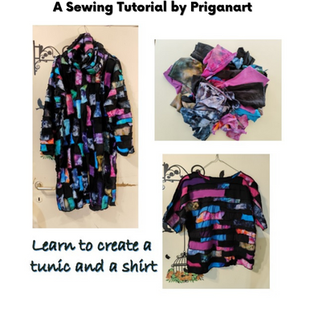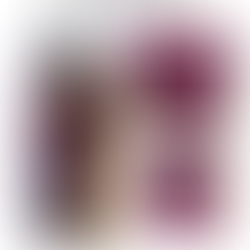I like high waisted, wide leg pants with lots of pockets and can never find them. I have two pairs that I wear that I have had for 20 years. I have searched high and low at second hand stores and charity stores, no luck.
I finally decided to draft a pair and in line with my decision not to buy any fabric have gone shopping in my stash. I have found a number of sheets and zippers and of course buttons for the closures and I am going to work on the first one today. They will have one flat pleat in front on both sides. Its going to have 4 pockets, 2 welt pockets and 2 external ones.
The first thing I need to do is make a pattern. I used a pair of pants that had holes in and were worn away to draft a pattern before making them into a bag. I opened the inner leg seam and after removing the zipper cut open the other seams to get two pieces like this. The pants are made out of 2 pieces with no outside seam.
I lay this pants piece down on brown paper and draw around it adding a 1 cm seam allowance all around. I also mark the pocket placement on the paper.

I fold the sheet in half and lay it down on the table placing the pattern piece over the doubled fabric. I also cut out a paper template for the larger pocket piece. I cut 4 pieces for the larger pockets and 4 pieces for the smaller welt pockets.

After cutting out the fabrics The first thing that I am going to do is to stitch the front zipper seam. I mark the stitching line and I stitch down from the top to the bottom stitching large stitches up till the arrow mark and from then to the bottom use a regular sized stitch. The stitch line on the fly front will be unpicked later.

I mark a pleat on both front sides of the pants. The width of the pleat is 5 cm and the depth is 6 cm, I mark the folding line in the center of each pleat. I mark the pleat 16 cm in from the fly front edge. I also mark the height of the welt pocket. 19 - 20 cm from the edge of the fly front and 18 cm wide. You can make the pocket any size. I like it a little wider and the height of the pocket is 20 cm.

After stitching the zipper seam I open it up and press both allowances to either side.

Now I need to stitch the pleats. I fold them on the center line and stitch down to the marking.

After stitching I press each pleat outwards and top stitch them down on the outside of the pants. I can add another stitching line further down on the pleat for decoration if I want to.

To construct the welt pocket I take one rectangle and place it on the line that I marked on the outside of the pants. I draw a rectangle with tailor's chalk on the pocket square. 3 cm down and 2 cm in from either side. I then stitch on the rectangle through both layers of fabric.

After stitching I cut a hole through both layers of fabric between the stitching lines.

The pocket piece is pushed inside through this hole. It has to be ironed now using either a steam iron or a regular iron and a water spray, the corners have to lie flat back and front. I decided not to use a zipper in these pockets but rather make a welt opening. I lift one edge of the pocket and fold it so that the fold lies on the hole and covers it. I iron it down and stitch around the edge of the pocket from the outside. After stitching around the edge, place the second piece of the pocket on the first one and stitch around both pocket pieces without stitching through the pant leg.

I ended up having a very small crease on one end of the pocket. I think I need to change the number of my glasses. This is what the welt pocket looks like from the outside.

I now take the 4 larger pocket rectangles and sew 2 pairs together, leaving a window by which I turn them inside out and iron. I place these stitched pockets 19 cm down from the waist measurement with the open windows at the bottom. I pin them in place and stitch around from top through bottom up the second side leaving the top open. This top stitch closes the window we used to flip the pocket. I stitched around a second time for strength and decoration.

At this stage insert the zipper and close the leg seams.

To draw a waistband I fold the pants so that the zipper and back waist seams are on the side. I then place the pants on a piece of paper and mark the top waist measurement and mark a second line 9 cm above that for the height of the waist band. For the seams I continue the angle of the back and front seams going up 9 cm and add on 1 cm each side for the seam allowance.
I cut out 4 pieces of fabric, sew 2 sets of 2 pieces with an ironed down center seam in each.. I pin one stitched band with the wider part of the waist band meeting the top of the pants and I stitch down on the edge.

I serge or zigzag the bottom wider edge of the second piece of the waistband. Place that right side face down on the waistband and stitch the top and sides. I then flip this over so that it sits on the inside of the pants covering the waistband seam.

This is what it looks like flipped over. I now iron it down and then top stitch all around.

I add a buttonhole and a button and the pants are done.

The insde view. The top stitching on the waistband covers the seam allowance and holds everything in place. I would normally add another piece of fabric and some topstitching or a fusible interfacing to the waistband but it is a very high waistband so from my experience it is not necessary for this particular design.

And here they are the purple sheet pants with 4 pockets and pleats.

Find more clothing tutorials here - https://www.etsy.com/il-en/shop/PriganArt


















Comments